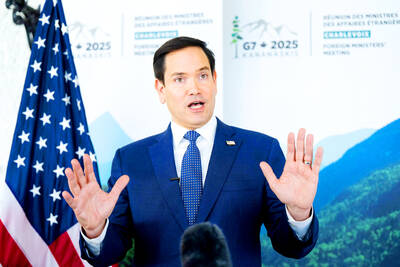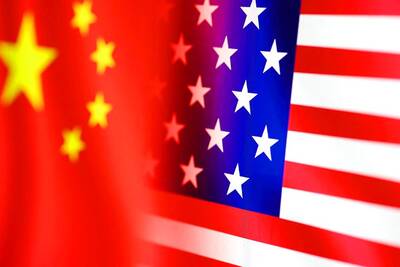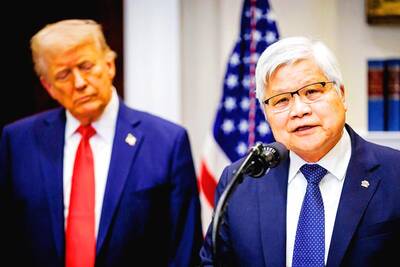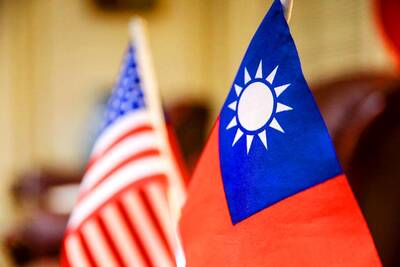President Ma Ying-jeou (馬英九) yesterday said China’s announcement of a new air defense identification zone (ADIZ) over the East China Sea has not helped with cross-strait development and the government would urge Beijing not to demarcate a similar zone over the South China Sea.
In an interview with Japan’s Mainichi Shimbun, Ma said China’s ADIZ over the East China Sea had sparked great concern in the region because the zone includes the Diaoyutai Islands (釣魚台), which are the territory of the Republic of China (ROC).
The Diaoyutais, which lie about 120 nautical miles (220km) northeast of Taipei, are also claimed by China and Japan, which call them the Senkaku Islands.
“The move does not bring positive development to cross-strait relations. In the future, we will talk to mainland China and ask them not to set up a similar ADIZ over the South China Sea,” he said.
When asked to comment about Japanese Prime Minister Shinzo Abe’s plans to push for a change in the Japanese constitution regarding its self-defense rights, Ma said the Treaty of Mutual Cooperation and Security between the US and Japan has played an important role in stabilizing Asia, and the Republic of China government has been supportive of the treaty.
“As a mature democratic nation, I think Japan will take neighboring countries’ reactions into consideration and act wisely,” he said.
The government issued a statement reiterating the ROC’s sovereignty over the Diaoyutais shortly after China announced its new air defense zone on Nov. 23, while promoting Ma’s East China Sea peace initiative calling on the concerned parties to resolve disputes through negotiations.
Japan and South Korea have ignored China’s demand to be notified about any flights passing through the zone and have sent military aircraft into the area in recent days, after US military aircraft flew through it.
The issue of China’s ADIZ has also been a key issue on the agenda for US Vice President Joe Biden’s current tour of Japan, China and South Korea.
Ma yesterday reiterated the efforts by the government to promote peace across the Taiwan Strait, and said it has never avoided political issues affecting cross-strait relations.
Citing the signing of cross-strait agreements and the proposed establishment of cross-strait representative offices, Ma said these issues carried some political significance, and the government is also promoting the service trade agreement to enhance exchanges and enable Taiwanese to profit from them.
He said the government will continue to adopt an “economics first, politics later” policy for dealing with China, and will address political issues when the timing is right.
In related news, American Institute in Taiwan (AIT) Chairman Raymond Burghardt is to arrive in Taipei tomorrow for a five-day visit.
Burghardt is set to meet with Ma and key political and business figures during his stay.
The visit has sparked the local media’s interest because of its timing, coming in the wake of China’s air defense zone declaration and Biden’s tour.
The AIT said the visit will be Burghardt’s 15th trip to Taiwan since he became chairman in February 2006.
Additional reporting by CNA

‘CROWN JEWEL’: Washington ‘can delay and deter’ Chinese President Xi Jinping’s plans for Taiwan, but it is ‘a very delicate situation there,’ the secretary of state said US President Donald Trump is opposed to any change to Taiwan’s “status quo” by force or extortion and would maintain that policy, US Secretary of State Marco Rubio told the Hugh Hewitt Show host on Wednesday. The US’ policy is to maintain Taiwan’s “status quo” and to oppose any changes in the situation by force or extortion, Rubio said. Hewitt asked Rubio about the significance of Trump earlier this month speaking with Taiwan Semiconductor Manufacturing Co (台積電) chairman C.C. Wei (魏哲家) at the White House, a meeting that Hewitt described as a “big deal.” Asked whether the meeting was an indication of the

‘RELATIVELY STRONG LANGUAGE’: An expert said the state department has not softened its language on China and was ‘probably a little more Taiwan supportive’ China’s latest drills near Taiwan on Monday were “brazen and irresponsible threats,” a US Department of State spokesperson said on Tuesday, while reiterating Washington’s decades-long support of Taipei. “China cannot credibly claim to be a ‘force for stability in a turbulent world’ while issuing brazen and irresponsible threats toward Taiwan,” the unnamed spokesperson said in an e-mailed response to media queries. Washington’s enduring commitment to Taiwan will continue as it has for 45 years and the US “will continue to support Taiwan in the face of China’s military, economic, informational and diplomatic pressure campaign,” the e-mail said. “Alongside our international partners, we firmly

KAOHSIUNG CEREMONY: The contract chipmaker is planning to build 5 fabs in the southern city to gradually expand its 2-nanometer chip capacity Taiwan Semiconductor Manufacturing Co (TSMC, 台積電), the world’s biggest contract chipmaker, yesterday confirmed that it plans to hold a ceremony on March 31 to unveil a capacity expansion plan for its most advanced 2-nanometer chips in Kaohsiung, demonstrating its commitment to further investment at home. The ceremony is to be hosted by TSMC cochief operating officer Y.P. Chyn (秦永沛). It did not disclose whether Premier Cho Jung-tai (卓榮泰) and high-ranking government officials would attend the ceremony. More details are to be released next week, it said. The chipmaker’s latest move came after its announcement earlier this month of an additional US$100 billion

COUNTERING THE PLA: While the US should reinforce its relations with partners and allies, Taiwan must invest in strengthening its defenses as well, Phillip Davidson said If influence in the Indo-Pacific region is one of the US’ core interests, then Taiwan serves as a cornerstone of US economic and security influence in the region, former US Indo-Pacific Command commander admiral Phillip Davidson said on Thursday. “China’s ... strategy is to supplant the US leadership role in the international order ... and they’ve long said ... that they intend to do that by 2050,” Davidson told the National Review Institute’s Ideas Summit in Washington. Davidson said he had previously told US Senate hearings on China’s military activities and possible threats in the Indo-Pacific region that a Chinese invasion of